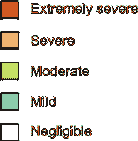
 |
The following map of the atmospheric corrosivity measured in Venezuela was adapted from "Atmospheric Corrosion of Copper in Ibero-America" by M. Morcillo, E. Almeida, M. Marrocos, and B. Rosales, Corrosion, Vol. 57, No. 11, pages 967-980.


Pollution and Water pollution is a major environmental concern in Venezuela. Rivers, lakes, and underground aquifers are becoming increasingly polluted due to oil development, untreated sewage wastes, and fertilizer run-off. Lake Maracaibo, Venezuela's largest lake, is suffering from increased pollution, and the resort island of Margarita suffers from frequent water shortages as the island's population exceeds its infrastructure's ability to provide water and treat waste. According to news reports in August 1999, the state oil company, PdVSA, faces about $1.5 billion in environmental liabilities. Cleaning up 15,000 oil pits, which collect contaminated sludge from oil wells, alone could cost $1 billion. Periodic spills have damaged local flora and fauna, with negative implications for biodiversity and for the local economy. Environmental concerns traditionally have not been a major focus of PdVSA, but the company has now adopted an environmental policy and pledges to rank environmental protection as one of its top goals. It now is in the process of cleaning up the most environmentally dangerous oil pits, many of which are seeping into Venezuela's water supplies.
Deforestation is a problem throughout South America, and Venezuela is no exception. About half of the country is under forest cover. The United Nations Food and Agriculture Organization estimated that Venezuela lost forest cover at a rate twice as high as the average rate for tropical South America between 1990 and 1995. Venezuela lost an average of 1.1% of its 44 million hectares per year of forest between 1990 and 1995, while all of tropical South America lost 0.6% of its 828 million hectares per year in the same period.
With World Bank assistance, the government of Venezuela is working to protect its 3.6-million hectare Imataca Forest Reserve. The Reserve's tropical forests remain mostly intact and are home to many unique species and indigenous peoples. Indigenous groups have often come into conflict with mining and timber companies, blaming the companies for degrading their environment and ancestral lands. (reference: http://www.eia.doe.gov/emeu/cabs/venenv.htm)
Other regions and countries: Argentina, Brazil, Canada, Central America, Chile, China, Colombia, Cuba, France, Germany, India, Italy, Japan, Mexico, New Zealand, North America, Portugal, Russia, Saudi Arabia, South Africa, Spain, Sweden, UK, USA, Venezuela
 |
 |